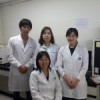2013 Microgrant Recipients
Below are the researchers and scientists that received the funds raised from the GIDAS fundraiser project on Indiegogo! Although the funds raised did not meet the inital goals, they are sufficient for completing each of the research projects! Congratulations to these researchers and look out for our future fundraising projects!
We appreciate BML, a Korean sequencing and array service company (http://www.bmlaboratories.com), which has agreed to profile small RNA seq and gene expression array for the breast cancer project covering the unmet cost, so that the breast cancer project can be carried out.
We expect to provide their research results soon.
Autism

Hi! I’m Laura – a graduate student at the Harvard Graduate School of Education in Boston, MA. I’m originally from Jamaica (I grew up there until I came to college in the States and my parents still live there), and I did my undergrad in biology at Yale University (class of 2008). I started doing autism research shortly after graduation from college – in college I did molecular biology/biochemistry research (usually in mice or zebrafish), but I got frustrated with the fact that basic science research probably wouldn’t lead to many impactful changes in practice during my lifetime, so I decided to try my hand at researching people, rather than researching fish. I was lucky to get a fellowship in clinical autism research at the Yale Child Study Center after graduating, and I’ve been hooked on autism research ever since. My goal is to understand more deeply – from a neuroscience perspective – how children with autism learn and how that’s different from the way neurotypical children learn, so that we do a better job of designing classrooms and school curriculum to benefit students with autism. The imitation project – which you have all helped me fund! – is a part of this overall goal. After I finish graduate school I want to work part time in the classroom as an educator, and part time in the lab as a researcher, so that I can research questions that arise from classroom practice, implement my findings right in my classrooms, and in general have research and practice constantly and mutually influencing each other to make schools better for children with autism.
Type 1 Diabetes

I am so thrilled for several reasons: first this project is supported by people who care about T1D, their support makes our work much more meaningful. I talked with my group, Viji Nair and Shahaan Smith, who worked very hard to identify new genes that can be used to mark the progression of T1D, we all are very much motivated by this good news and would like to sincerely thank the students and the people who donated money for our research; Second, the continuous funding cuts from NIH makes it very difficult for junior faculty, who are the future of the research on Science and Medicine, to pursue our goal to cure disease. Therefore any dollar of support means a lot for Junior faculty like me. And we value it, we will make the best use of it.
Breast Cancer

I am very glad to contact GIDAS members. I have been interested in your activities since last year when I was staying in Ann Arbor as a visiting scholar at the U of M Cancer Center. I have been researching on natural compounds such as HCA extracted from cinnamon stem bark to control primary and metastatic breast cancer. Now, one of my major research interests is how we can control cancer stem cells that cause metastatic cancer, and I want to use HCA for this purpose. In addition, if we can inhibit or attenuate epithelial-mesenchymal transition (EMT), we might be able to control cancer stem cells. It has been generally known that conventional anticancer drugs are not effective on cancer stem cells, therefore, it would be urgent to develop new drug which can inhibit cancer stem cells. Our team evaluated that HCA shows anti-metastatic and anti-EMT effects on breast cancer in in vitro and in vivo. Therefore, it should be uncovered whether or how HCA inhibits breast cancer stem cells. Even though the cancer stem cells in cancer recurrence and metastasis are of great importance, little has been known about how and from where cancer stem cells are originated. However, previous studies showed that microRNA plays an important role for this process. Thus, it would be meaningful to uncover how HCA affects on mRNA/microRNA expression to control cancer stem cells. I really appreciate your interests in breast cancer and HCA. It would be very helpful if we can evaluate the expression changes of mRNA/microRNA by HCA in breast cancer cells.
